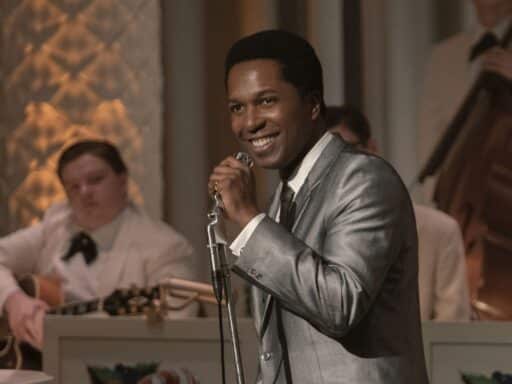Regina King’s directorial debut follows Muhammad Ali, Sam Cooke, Jim Browne, and Malcolm X over one night in 1964 — and their conversation rhymes with today.
“Four guys hang out and talk all night” is not, perhaps, the most obviously exciting setup for a movie. But when those four men are Muhammad Ali, Malcolm X, Sam Cooke, and Jim Brown, the potential for intrigue shifts, and One Night in Miami is the result.
One of the most buzzed-about films out of the 2020 Toronto International Film Festival, One Night in Miami is a triumphant directorial debut for Oscar-winning actress Regina King, star of HBO’s Watchmen. She teamed up with the playwright Kemp Powers (also the co-writer and director of Pixar’s Soul), who adapted the screenplay for One Night in Miami from his stage play.
The film has the feel of theater, focusing on conversation and subtle power dynamics rather than a lot of movement and action. But some nimble staging and stunning performances from all four of its lead actors make One Night in Miami pulse with energy.
As its title promises, One Night in Miami imagines a single night, in 1964. Muhammad Ali — still going by Cassius Clay at the time (and played by Eli Goree in the film) — had defeated Sonny Liston to become Heavyweight Champion of the World. To celebrate, he gathered in a motel with NFL star Jim Brown (Aldis Hodge), singer Sam Cooke (Leslie Odom Jr.), and Malcolm X (Kingsley Ben-Adir).
In real life, those men did gather that night, but history hasn’t recorded what they talked about. So Powers imagines it. Brown and Cooke are expecting girls and a party to celebrate Clay’s victory. But Malcolm X is there as a spiritual mentor to his friend; Clay is on the verge of converting to the Nation of Islam, and to adopting his new name. And so, sticking to his convictions and setting an example for the newly crowned champion, Malcolm proposes ice cream and conversation instead.
The discussion that follows is wide-ranging and rooted in who these four men are, and the particular challenges they face as Black professional athletes, performers, and leaders in a rapidly changing America. There’s pressure to cater to white audiences, to not rock the boat. There’s insidious prejudice rooted in colorism. There’s the threat of police violence directed at them simply for being Black men. And there’s religious identity, as well as the respectability politics that can get tied up with how, and who, you worship.
/cdn.vox-cdn.com/uploads/chorus_asset/file/22237696/one_night_in_miami_ONIM_D18_0097RC3_rgb.jpg) Patti Perret/Amazon Studios
Patti Perret/Amazon StudiosSomehow the movie keeps from feeling heavy-handed or contrived, the way other play-to-film adaptations that deal with matters of American racism (such as Christopher Demos-Brown’s American Son) can’t manage. King injects the conversation with dynamism, building out the uneasy world the men occupy by showing us the adulation of crowds alongside the casual racism of friends and strangers alike.
But it’s the performances, especially, that make One Night in Miami sing. The best might be Odom’s as Cooke, a bona fide star whose songs are familiar to everyone, but who’s grappling with whether he needs to be doing more with his platform for the cause of equality and freedom. Right now, Odom is best known as Hamilton’s original Aaron Burr, and his easy smile, which belies just a hint of uncertainty, says everything.
Meanwhile, Ben-Adir’s complex rendering of Malcolm X, Hodge’s athletic and deeply wounded Brown, and Goree’s boastful and quick-witted Ali are all stunning to watch. Inhabiting a character who really lived is hard enough; playing someone who was a celebrity without reducing your performance to mimicry is even harder. There’s a sense in One Night in Miami that we’re getting to glimpse the men beneath the public exterior, the real three-dimensional individuals who slip behind a carefully maintained veneer to preserve the self.
/cdn.vox-cdn.com/uploads/chorus_asset/file/22237704/one_night_in_miami_ONIM_2020_KeySet_4500x1868_00043_rgb.jpg) Patti Perret/Amazon Studios
Patti Perret/Amazon StudiosIt’s impossible to miss the way One Night in Miami rhymes with the present. The matters the men discuss have long-reaching consequences for them, and for the choices they make as they look ahead to the future. But they have big echoes today, too. Each is still an important figure for a reason: They chose to exert their power in particular directions, to influence how people would think of them — and of Black Americans — for decades past their own lives.
One Night in Miami is entertaining and provocative, but it’s also a reminder of how much the recent past still dwells with us in the present. It’s no accident that at the end of the film, Cooke is just beginning to sing one of his most enduring tunes, “A Change is Gonna Come”:
I just need some comfort
Some kind of belief
That this war we’re fighting
Can really bring some peace …It’s been a long, long time coming
But I know that change is gonna come
One Night in Miami begins streaming on Amazon Prime on January 15.
Author: Alissa Wilkinson
Read More



